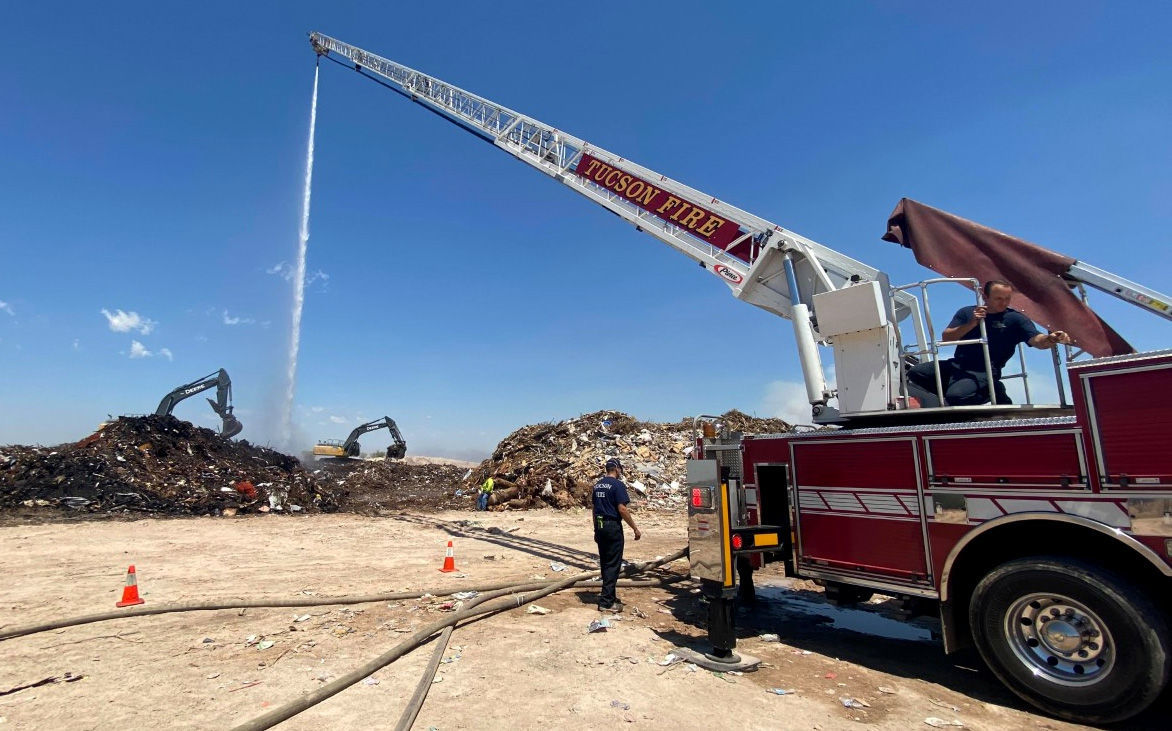If the past few weeks have felt like an unrelenting garbage fire, you might be onto something.
It’s an already stinky problem that gets even worse during the hot summer months in Tucson: landfills and garbage trucks bursting into flames because of improperly discarded batteries and other household hazardous materials.
Such “flare-ups” happen all the time at the city’s Los Reales Landfill near Craycroft Road and Interstate 10, said Kenda Hall, spokeswoman for the city of Tucson’s Environmental and General Service Department.
The usual culprits are lithium-ion rechargeable batteries that get tossed in with people’s trash or recycling instead of being disposed of properly. These old batteries then get mixed in with other waste at the dump and spark fires when they are crushed or heated up.
“We have them every week out at the landfill,” Hall said.
Chlorine also poses a risk, because it’s dangerous for the environment and can start a fire if it is mixed with acid, she said.
The flare-ups are usually spotted right away, when they’re small enough for landfill workers to quickly douse with water. Sometimes, though, they can get out of control.
In the early morning hours of June 11, a large blaze broke out at the Tank’s Recycling and Landfill Facility near Speedway and Kolb Road. The suspected cause: some sort of household hazardous material that was disposed of improperly, said Tucson Fire Department spokesman Michael Colaianni.
“It’s definitely an issue,” he said.
Occasionally, improperly discarded waste will catch fire before it ever reaches the landfill. Hall said garbage trucks compact trash as they go, and that pressure can be enough to cause a lithium-ion battery to ignite.
Such truck fires happen so frequently that drivers and firefighters have a name for them: They call them “hot loads,” Hall said.
The standard procedure in a case like that is to dump the burning garbage out along the road to protect the driver and the truck, then call the fire department.
“It’s dangerous and messy and not fun to clean up,” Hall said.
Last year, a city garbage truck valued at about $300,000 was destroyed in such a fire.
Hall said the flammable trash problem seems even worse than usual this year, maybe because the city has temporarily closed its Household Hazard Waste facilities and canceled all hazardous waste drop-off events due to the coronavirus pandemic.
Instead of holding on to their old batteries and other potentially dangerous junk for the time being, some residents may just decide to toss them out with the rest of their trash.
“I think that’s definitely a possibility,” Colaianni said. People stuck at home “maybe aren’t being as careful as they normally are with hazardous materials,” he said.
Whatever the reason, the city wants the garbage fires to stop.
Next week, Colaianni said, he and Hall are slated to film a public service announcement in hopes of snuffing the problem out.
“It’s a pain in the butt for Environmental Services, and it’s a pain in the butt for us,” he said.





